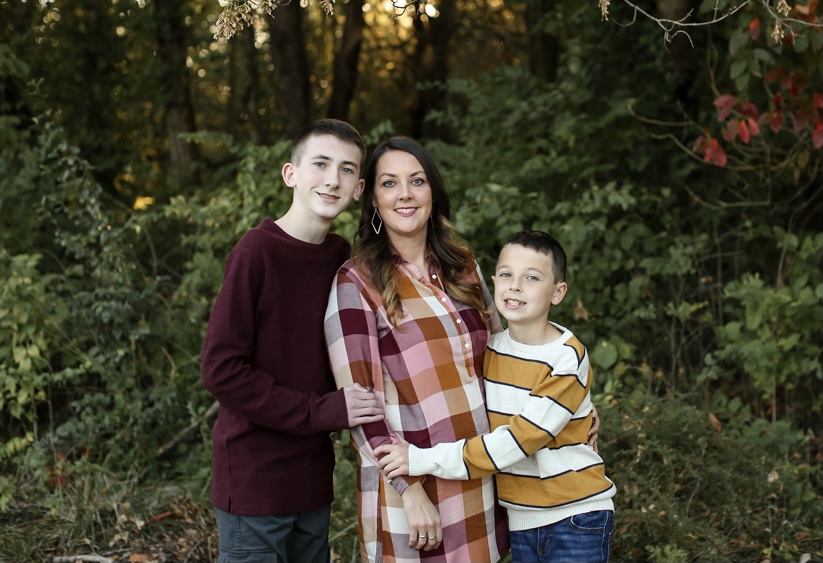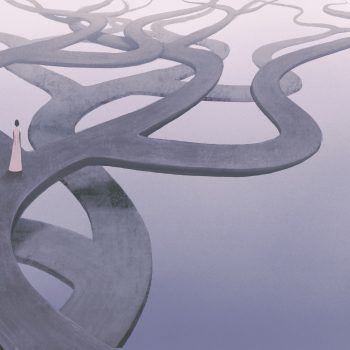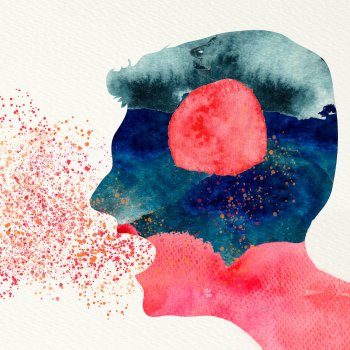I Did Not Kill My Husband
/ Emotion : Litsa
When you connect with a lot of grief accounts on Instagram, patterns emerge. A lot of similar account names - things about grief and growth, remembrance and survival, widowlife and angelmom handles. So when @ididnotkillmyhusband popped up participating in our Instagram grief photo challenge, I was immediately intrigued. And I'm so grateful it didn't blend in, because when I clicked on the feed I immediately connected to the work that was happening there.
If you've been here at WYG for a while now, you know that the grief of loving someone with an addiction and the grief of losing someone to addiction are a huge part of our story. It's a huge part of the story of today's guest author as well.
Welcome, Annie Parker aka @ididnotkillmyhusband
In 2020, Annie’s husband lost his life to the disease of alcoholism. In an attempt to stop this vicious cycle from continuing, her family focuses a lot of their time and energy working on recovering together out loud.
Through her turbulent life experiences, Annie has found a deep passion for educating people from ages 8 to 98. Whether teaching children in her third-grade classroom, inspiring like-minded peers through her memoir and Instagram, or writing patient advocate articles for the blind elderly via the website she writes for, Annie finds purpose through helping others navigate their own personal struggles in life.
Annie’s philosophy is that knowledge is a superpower and her passion for helping others centers on the ideology of living a holistic, healthy lifestyle and breaking the stigmas surrounding prioritizing self-love, self-worth, and mental health.
While battling her way to happiness and peace for herself and her family, Annie has gained a vast array of experiential expertise on complex issues that include: Emotional abuse, suicidal ideation, grief, anxiety, anger, the family disease of alcoholism, mental health therapy, and blindness.
We're thrilled she's agreed to share a small bit of her experience with us here. If you want to connect with her more, you can find her on Instagram @ididnotkillmyhusband. You can also check out her book, I Did Not Kill My Husband : But I Almost Killed Myself (Hard Truths of Healing Trauma) which has 5 stars on Amazon (which is more than we can say about our book!). Without further ado . . .

Hi, I’m Annie, teacher, author, mom of two young boys, and I have been widowed by the disease of alcoholism. My husband, Chris, died in the summer of 2020. His official cause of death was ‘a heart attack due to prolonged use of alcohol’.
What really happened was he had a heart attack while trying to detox from alcohol without medical help. He was 37 years old, and will remain 37 until the end of time. It always baffles me to think that someday his sons will be older than him. That’s what happens when time just stops for someone. Everyone and everything else keeps moving forward.
2020
… What a crazy, chaotic time to lose a spouse. I guess I should clarify, he wasn’t my husband anymore when he died; we were 45 days divorced.
Husband, ex-husband, late husband, dead husband, the father of my children . . . the label doesn’t matter one bit when this is a person’s reality. When you’re married to someone struggling with a substance use disorder, you lose them over and over again in so many different ways, not just by death.
Whether your loss is due to incarceration, rehabilitation, divorce, them just being checked out and unable to function because of intoxication (or lack of it) . . . you grieve the entire time.
Blame
Though I could write on so many aspects of this type of loss, I want to write about something really important, difficult, and common that accompanies the loss of a spouse due to addiction- being blamed for that person’s death by their friends and family.
I was grieving deeply for my own loss, as well as all the secondary losses that accompany the death of a spouse. You know, losses like becoming the solo parent of grieving children, the loss of the life I had planned for our family, the loss of financial stability, loss of a partner to help with the kids, loss of the person who always knew how to get the internet working again, becoming the one who has to make all the decisions… the list goes on and on.
On top of all of that, (as if that wasn’t enough already), we were right smack in the middle of a pandemic - lockdown to be specific. And I wasn’t getting much support from people who were supposed to step up. You know, Chris’s dad and friends.
I wasn’t just unsupported, I was being emotionally attacked. I heard things like, “He gave up the moment you kicked him out.” And, “He didn’t want that divorce, you did this to him.” I heard, “I didn’t know it was that bad; if you would have told me, I could have helped.” And. let’s not forget my personal favorite, “You gave up on him when he needed you the most.”
Deep breaths.
My husband’s father was so angry with me over his death that he didn’t even attend the funeral. Nor did he help pay for the burial or visitation. Honestly, I was happy to be the one to bury my husband. It felt like one last thing I could do for him to show him love and care. And, it was something I could do for myself and for our kids. Even so, the way this was all handled was painful and inappropriate, and it has taken some deep recovery work to come to peace with it.
After a few years of Al-Anon, a twelve-step program for friends and family members of alcoholics, and after a lot of recovery work, I now know a few things that I didn’t know when this was happening to me. I want to share my experience here in an attempt to be a sounding board for anyone who has experienced this same type of treatment. This experience of being blamed while grieving isn’t openly discussed often enough.
Here it goes:
People place blame for a few reasons. Sometimes they are projecting their own feelings of guilt onto others because they can’t handle feeling any of it themselves. Other times, they are placing blame where it doesn’t belong because they simply do not understand addiction.
Addiction is a beast of a disease.
I also know that alcoholism is called a family disease for a reason; we all become ill. Our behavior starts to mirror the behavior of the person with the addiction. Because of this, I know that my husband’s father and his friends have also been affected by his disease. They, too, are sick. And they’re in denial.
At first, it was really (REALLY) painful to be blamed for my husband’s death. I mean, I already had so much of my own guilt and all the ‘what ifs’ running around in my head while trying to process everything.
Al-Anon has taught me that I had absolutely no control over what my husband decided to do. It didn’t matter if we lived together, or if we divorced, or if we stayed together forever; he was going to drink himself to death anyway if that’s what was going to happen.
We call this detachment the three C’s:
I didn’t cause it, I couldn’t control it, and I couldn’t cure it. Staying true to my own self-worth, and being a healthy parent for my sons, I like to add two more C’s as well: I won’t contribute to it and I won’t condone it. It was up to me to put the work in to recover from this. And it was up to Chris to do the same (as well as his parents and friends).
I’m the only person alive who knows the full truth. That allows me to be confident in my decisions in the past, the present, and in the future. I no longer feel so angry for being blamed for Chris’s death. Now, I know that these blamers are unable to direct their feelings properly (inward to be healed) because they just don’t know any better. They are ignorant (in the true meaning of the word). I know my truth, and you sweet friend, know your truth as well.
If you’re the family member of someone who has died in this way, please know how difficult this has been on their spouse and children (for years and years). Please educate yourself on the disease of addiction. Please remember that there is no blame to place.
I’m sending love and hope out to anyone reading this article today. I know that if you’re here, it’s probably because you’ve experienced or are experiencing something similar. There is help out there for anyone involved.

We invite you to share your experiences, questions, and resource suggestions with the WYG community in the discussion section below.
We wrote a book!
After writing online articles for What’s Your Grief
for over a decade, we finally wrote a tangible,
real-life book!
What’s Your Grief? Lists to Help you Through Any Loss is for people experiencing any type of loss. This book discusses some of the most common grief experiences and breaks down psychological concepts to help you understand your thoughts and emotions. It also shares useful coping tools, and helps the reader reflect on their unique relationship with grief and loss.
You can find What’s Your Grief? Lists to Help you Through Any Loss wherever you buy books:





marcia.frank55@gmail.com July 19, 2023 at 6:15 pm
My almost 80 yo husband of 19 years passed away Feb. 25th, 2023 after 3 years of dealing with his health failing. He was a very strong, smart, independent man and fell into depression after not recovering, or bouncing back from quadruple bypass surgery as he expected. When he fell and broke his femur and had surgery the first of Feb., his kidneys failed and he refused dialysis. He passed 10 days later. I am dealing with my anger (not directed at him) and reading your articles has helped. I have ended relationships with family and friends and reading your articles explaining why has helped. I am so glad I found your site.
Mary Beth C July 3, 2023 at 6:16 pm
I recently lost my husband of 35 years to alcohol.
In the beginning of our marriage, it wasn’t a problem, but towards the end he had health problems due to alcohol, and had a mild stroke and seizures. Eventually he fell and hit his head, and his heart gave out.
I am still feeling numb and need to deal with grief and anger. I’m lucky I have my children who are helping me with financial and property issues.
Please if there’s anything you could advise, I appreciate it
Mary Beth C July 3, 2023 at 5:54 pm
I appreciate what you wrote in this article. My husband passed away two weeks ago after 35 years of marriage and also of him drinking. In the beginning of her marriage didn’t seem to be a problem, but then more recent years have been problematic with his health, and he passed of a heart attack after falling and hitting his head. I try not to feel guilty as if I could’ve done anything to stop it.
Susan June 3, 2023 at 2:13 am
I am struggling lost my partner of 20 years this February. Heart gave out.